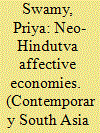| Srl | Item |
| 1 |
ID:
165237


|
|
|
|
|
| Summary/Abstract |
This article is a preliminary attempt to understand the dynamics of how Patanjali and Baba Ramdev represent ‘Hindu nationalism’, or Hindutva (Hinduness) in Nagaland, India. One can read Baba Ramdev's foray into the region through the promotion of yoga, Ayurveda, and national health, as a form of ‘neo-Hindutva’ that is increasingly diffuse and moves away from a more militant pathway of established Hindutva designs. If one considers the work of Patanjali in Nagaland as an attempt to homogenise and unify a set of practices surrounding food and health practices, then, one can read this as an attempt to assert a singular somatic imagination, increasingly influenced by Hindutva ideas about the body, ‘the health of the nation’, and the promotion of swadeshi (indigenous goods) as patriotic duty. This article highlights the way Ramdev and Patanjali's business empire is trying to move beyond the ‘cow belt’ of north India, comprising mainly of ‘Hindu-Hindi’ into regions that are more diverse linguistically and historically, and culturally viewed as ‘un-Indian’.
|
|
|
|
|
|
|
|
|
|
|
|
|
|
|
|
| 2 |
ID:
165239


|
|
|
|
|
| Summary/Abstract |
This article contests the role that India as a ‘motherland’ plays in the circulation of neo-Hindutva sentiments by exploring the relationship between reterritorialisation, affect and citizenship identities among Surinamese Hindus in the Netherlands. Following Jones (2016, 2014), this article posits that Surinamese Hindu citizens are ‘conditional’, which causes some community actors to strategically reterritorialise Hindu practices and identity as part of the Dutch landscape. Other groups protest their place as conditional citizens as they see their religious practices under threat by cultural and neo-colonial appropriations. In this way, what it means to be Hindu is circulated through a neo-Hindutva affective economy (Ahmed 2004). By presenting ethnographic data that explores the importance of pride and offense as ways to ‘be Hindu’ at an HSS shakha summer camp in 2016 and during a Hindu protest campaign in 2015, this article aims to make sense of the ways in which neo-Hindutva sentiments associated with reterritorialisation strategies respond to citizenship regimes that exist in the Netherlands today.
|
|
|
|
|
|
|
|
|
|
|
|
|
|
|
|